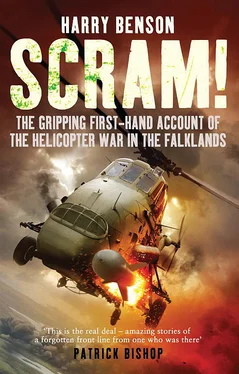In the early nineteenth century, there were several short-lived attempts to establish settlements on the Falklands. The newly independent Argentine government appointed the most committed of these settlers as commandant in 1829. The British protested that Spanish rights had not transferred to the Argentines and, four years later, sent a garrison to establish administration over all of the islands. British colonisation followed in 1845 at the new capital, Port Stanley, on East Falkland.
Argentina continued to dispute British sovereignty, eventually bringing the issue to the attention of the United Nations in 1965. The geographical location of the islands – so close to Argentina and so far from Britain – argued for a transfer of sovereignty. But this was heavily constrained by the wishes of the islanders to remain a British dependency.
The military junta that took control of the Argentine government in 1976 was determined to press the issue. The establishment of an Argentine military base at South Thule, part of the South Sandwich Islands, provoked the British government to send a naval task force to the South Atlantic in 1977. However, reluctance to eject the Argentine occupiers by force resulted in diplomatic stalemate. This merely encouraged the junta that an invasion of the Falklands would not be resisted.
On Friday, 19 March 1982, Argentine soldiers masquerading as scrap merchants landed on the British dependency of South Georgia, another small group of islands under the administration of the Falkland Islands some 800 miles to their north. South Georgia is notable for its severe mountainous scenery, glaciers, wildlife colonies and appalling weather. The soldiers resisted the efforts of the British Antarctic survey ship HMS Endurance and her party of Royal Marines to encourage their repatriation.
Two weeks later, on Friday 2 April, a much larger Argentine force invaded the Falkland Islands, quickly overwhelming the resistance of the Royal Marines stationed at Port Stanley. It was the cue for the small force occupying South Georgia to raise their national flag. The Falkland Islands and South Georgia were now firmly in Argentine hands. The question now was: How would the British government respond?
Chapter 1
An inauspicious start: 22 April 1982
ONE OF THE first British acts of the Falklands War was the attempt to recover South Georgia using the elite troops of Britain’s Special Air Service. Still buoyant from their dramatic success in releasing hostages from the Iranian Embassy siege in London two years earlier, an SAS team planned to take control of South Georgia by the most unlikely and unexpected route. Inserted by two Royal Navy commando Wessex helicopters of 845 Squadron onto the Fortuna Glacier, the largest tidewater glacier on South Georgia, the plan was for them to march across the spine of the huge mountains and take the unknown Argentine force at the whaling station at Leith by surprise .
Despite warnings about the treacherous and unpredictable nature of the sub-Antarctic weather and conditions high up on the glacier, the SAS were inserted. Overnight, on 21/22 April 1982, the weather duly did its worst: a violent storm, the wind gusting to 100 knots and producing squalls of driving snow, stopped the SAS in their tracks after just a few hundred yards progress. With frostbite and exposure a real concern, the SAS troop commander radioed for the helicopters to return and rescue them .
Below the faint disc made by the whirling rotor blades, Lieutenant Mike Tidd had a clear view over the edge of the glacier and down to the sea far below in the distance. The wind was gusting all over the place. Even on the ground with no power applied, his Wessex was still trying to fly itself sideways across the ice. Tidd glanced inside at the cockpit gauges. The air-speed indicator needle flickered between thirty and sixty knots of wind. Flurries of snow whipped over the surface. Conditions on top of South Georgia’s Fortuna Glacier were fearsome, far worse than anything Tidd had previously experienced training in the mountains of northern Norway. The helicopter was shaking viciously from side to side. Frankly it was terrifying. The sooner they were safely off the glacier and back on board ship the better.
The six huddled SAS troops skidded and stumbled their way towards the Wessex 5, away from the limited protection of the rocks, heads down into the helicopter downdraft. A smear of orange dye stained the snow, the remains of a smoke grenade used to pinpoint their location. Dressed in their white Arctic clothing, the soldiers were in varying stages of hypothermia after exposure to a night of sub-zero temperatures, gale force winds and driving snow. Seated just below and behind Tidd, Leading Aircrewman Tug Wilson helped them stuff their kit into the cabin of the Wessex. As they clambered wearily aboard, he poured each of them hot soup from a thermos.
‘I think we’d better get out of here.’
Tidd’s voice on the intercom sounded electronic, distorted by the throat microphone attached around his neck. He looked out to his left, past the M260 missile sight suspended from the cockpit roof that partly blocked his view. He could just make out the two other Wessex helicopters nearby, still loading their troops. A lull in the weather, between the wild and unpredictable snow showers, presented a window of opportunity.
‘Thirty seconds, boss,’ called Wilson. ‘I’m just getting the last ones in now.’
‘Four Zero Six, Yankee Fox. I’m loaded and would like permission to depart. It looks clear right now.’
Tidd radioed across to mission leader Lieutenant Commander Ian Stanley in the adjacent Wessex 3. Equipped with radar and flight control systems, the single-engine Wessex 3 was there as pathfinder for the radar-less twin-engine, troop-carrying Wessex 5s. Stanley had led Tidd in Yankee Foxtrot and his colleague Lieutenant Ian Georgeson in Yankee Alpha, the second Wessex 5, in close formation up to the top of the glacier. The plan was for all three helicopters then to fly back down in formation the same way they had come up, the Wessex 3 keeping them clear of the mountains through the snow and poor visibility.
In the cockpit of the Wessex 3, Stanley and his co-pilot Sub-Lieutenant Stewart Cooper looked at each other and nodded. OK. Let him get out of here while the going is good . He had done the same yesterday when they dropped the guys off. Ian Stanley was confident that Tidd would know what he was doing. Both Tidd and Georgeson were far more experienced at flying in these Antarctic conditions, having trained with the Royal Marines in the Arctic.
‘Roger Yankee Fox, you’re clear to go. See you back there.’
Tug Wilson leaned out of the back of the Wessex, restrained by his aircrewman’s harness, and checked that all was clear behind. ‘OK boss. Let’s go.’
With the wind blowing hard up the glacier, Tidd had only to ease the collective lever upwards a little for the seven-ton machine to jump eagerly into the air. Half a mile ahead lay a snow-covered ridgeline before the glacier sloped steeply downwards towards the sea and relative safety. The escape route ahead looked straightforward enough, passing between the giant forbidding mountains that rose high above them on both sides. The very edge of a snow shower appeared just as Yankee Foxtrot lifted. Tidd accelerated to sixty knots, staying low over the glacier in case he needed to land again. Wilson slid the rear door closed to shut out the icy wind and make best use of the cabin heating system for the benefit of the frozen SAS troops.
The speed and ferocity with which the weather changed was astonishing. Without warning, the snow shower encompassed the helicopter like a tidal wave. ‘Tug we’ve got a problem,’ shouted Tidd whose world had suddenly turned white. It was like being submerged in a glass of milk. The ridgeline at the end of the glacier, and the sea behind it, had vanished into the snow. As Wilson quickly slid open the rear door to help look for visual cues, Tidd banked left to try to return to the rocks he had seen a few seconds earlier. It was a fifty-fifty decision that ended up saving their lives.
Читать дальше












